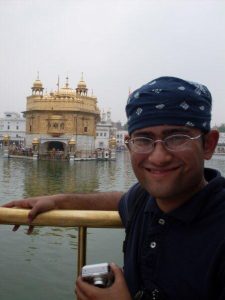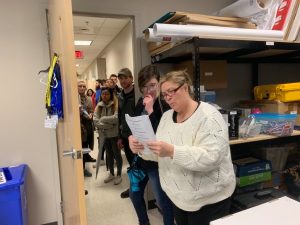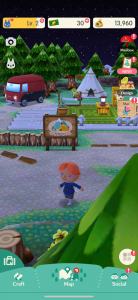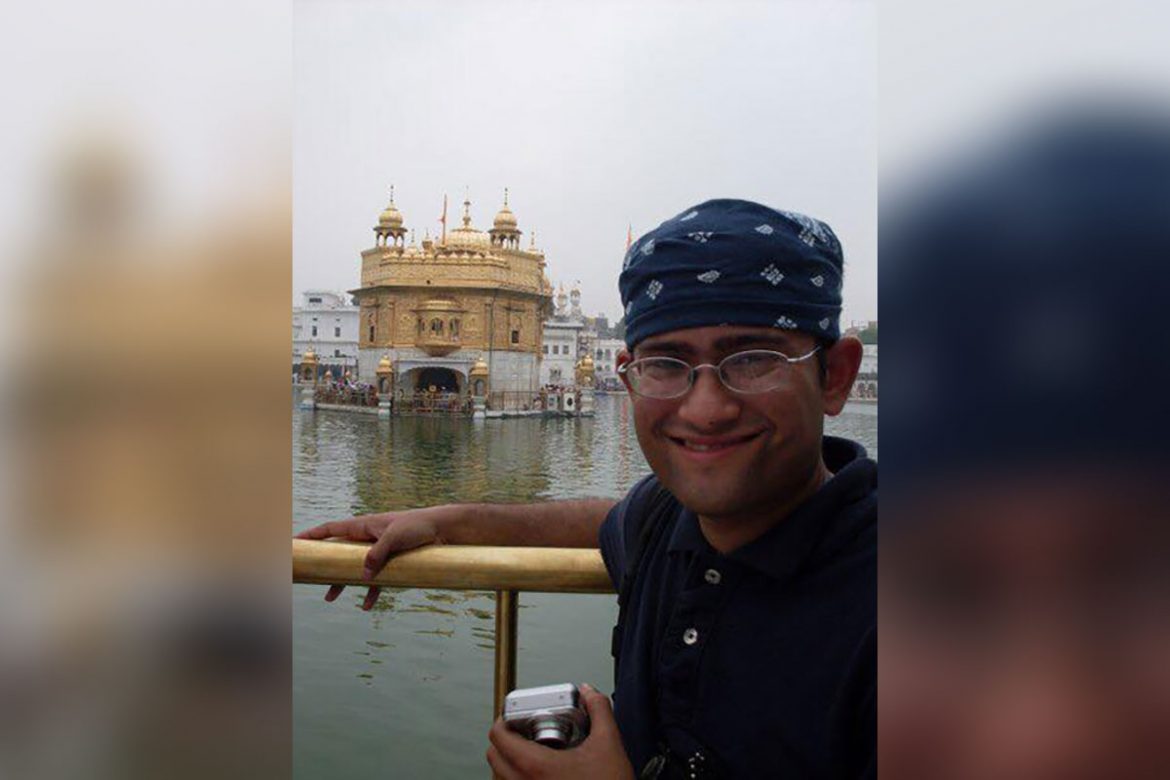After the abrupt disruption of MTSU’s spring semester due to the Coronavirus, students are working hard to adjust to the new learning systems. Classes that were once held in bustling lecture halls are now being held in front of impersonal computer screens, and days that were once filled with casual structure and reliability are now completely thrown out the window in favor of spotty livestreams and equally spotty technological knowledge.
But, as Blue Raiders often do, the students are persevering.
Study groups have been made, group chats have been amassing members and photos of animal sidekicks are being shared to lift spirits. Amidst the chaos, students are finding small but essential ways to bring a touch of normalcy to their new reality.
Students aren’t the only ones finding new ways to make this whole situation a little better, though.

Dr. Rohit Singh (Photo courtesy of Dr. Rohit Singh)
Meet Dr. Rohit Singh, an assistant professor in MTSU’s religious studies department, who has foregone average video-conferencing in favor of a more creative approach —virtual reality classes using games such as Animal Crossing and Second Life.
“It’s been a challenge,” Singh said, describing the shift from normal classes to remote classes. “Part of what I find exciting about the course is that sense of community, that sense of dialogue. Also, the important element that’s overlooked by others: play. In some of my classes we act out skits, we have competitions, we have debates—that sense of play is so important. A friendly competition can bring out the best in many people, and it can bring out the best in a teaching environment. So trying to figure out how to replicate play, how to build community— how do I do that?”
Thankfully, Singh is no stranger to connecting work and play, particularly in an academic field.
As a professor whose interests lie in the supernatural and the paranormal, Singh’s entire career path was shaped by the importance with which he viewed play.
“Ever since I was a little kid, I used to pretend I was a ghostbuster!” he laughed. “I think I was, like, four or five, and my favorite game to play was ghostbusters. And since then, I’ve been obsessed with wanting to find and meet ghosts. And this sort of led me to my research interests in fields like demonology, the paranormal, magic… And, well, I ended up getting a Ph.D. in religious studies, and I ended up getting a position here at MTSU.”

Dr. Singh’s teaching assistant and class mascot, Padma, helping plan the new virtual reality classes. (Photo courtesy of Rohit Singh)
Currently, Singh is teaching a class titled “Supernatural Encounters”—a class perfectly suited for his new immersive virtual reality-plan.
“When we talk about the supernatural or the paranormal, there’s an immediate reaction to just be like ‘Oh, that’s just a bunch of make-believe or superstition. That’s the stuff we chuckle about,’” Singh said. “When in fact, cultures around the world take these beliefs and things associated with supernatural beings very, very seriously. And I think, as an object of academic study, it is very much understudied. And I think it can give us a window into a variety of different traditions and stories, practices, artwork, films, video games—all over the world. We look at everything from alien abductions to demonic possession, exorcism rituals, and what these tell us about different cultures and societies and traditions. I think these are gateways to understanding specific cultures, but perhaps more broadly, what it means to be a human.”
Given the broad array of materials studied in the course, Singh knows he still has a particular opportunity to make an impact on his student’s education.
“The way I look at a class, I don’t necessarily see this hierarchical dynamic between teacher and student,” Singh said. “We’re engaged in dialogue and conversation. We’re taking a journey together. For example, when we took a ghost tour of MTSU as a class, we were just all working together to figure out what might be significant about these places…So really, when I teach, it’s not like I am just imparting knowledge on students: we’re working together, we’re collaborating, we’re engaging in mutual problem-solving. I just kind of facilitate the process.”

Students of Dr. Singh’s Supernatural Encounters class follow clues and hunt ghosts across MTSU as they learn more about MTSU’s campus folklore. (Photo courtesy of Rohit Singh)
To continue to facilitate this process, despite the interruption by the virus, Singh is utilizing three main virtual reality programs.
“A couple of things I’m requiring students to download. Number one is a thing called Second Life, where you create an avatar and you enter a virtual world,” Singh explained excitedly. “This virtual world actually has a variety of religious sites. It has the cathedral of Notre Dame in France, the temple of Bastet in ancient Egypt—for our class, I’ve had to adapt, and I’m thinking, you know, we might have to add a little bit of magic to the class, so we’re going to go to a virtual Wiccan learning center!”
“There’s so many fascinating things!” he continued. “We can go to temples—and you know, the rule is you have to take off your shoes before entering many temples, and you can take the shoes of your avatar! So this is an element that I’m hoping I can replicate some of that normal class immersion.”
The second immersive piece of his plan involves Google Arts and Culture, a Google platform through which the students can access high-resolution images of artwork housed in the various partner museums and historical sites.
“Google Arts and Culture has a couple of places where students can use their computers and just walk around over 1,200 different museums, and it’s a complete panoramic view! Like I just toured the Taj Mahal! Students have a lot of stress right now. So I just want to give them something funand immersivebut highly educational and stimulating and relevant to course content. I might have students explore some of these museums and tell me, you know, what sights appealed to them, what sights resonated with our class and what would they recommend other students go and see?”
Finally, students are recommended, but not required, to utilize the game Animal Crossing to get in some much-needed socialization.

Singh’s Animal Crossing Avatar, Dr. Red, prepared to pick apples, tend plants and help students destress thirty minutes at a time. (Photo courtesy of Rohit Singh)
“For 30 minutes a day, I’m going to be using a game called ‘Animal Crossing Pocket Edition,’” Singh said. “Students can go on this and I will be on the chat room via D2l, and we can help each other plant gardens, trade fruits….it’s just something comical and fun to do in the midst of a pandemic. And although I’ll be holding most of my office hours through Zoom and the D2l chat board, for 30 minutes students can go on there and they can interact with me, they can interact with each other, trade fruit or play as little animal people. This is just something to get students out of the stress of what’s going on in the world. That’s a lot of what I’m hoping for in this teaching—we are going to have some traditional study boards, we are going to have some homework assignments, but I know students are very, verystressed, so if I can give them something immersive to at least give them a break from thinking about the worries of the world while engaging in class content in a way that’s fun, immersive, and intellectually stimulating, that’s what I’ve been working on.”
When asked “Why Animal Crossing,” Singh laughed.
“It’s a fun, wonderful, adorable game. I think a lot of people, with all the stress that’s going on, would feel great to just get away from it all for a little while. And I think Animal Crossing gives that feeling. So instead of worrying about toilet paper being gone, or some real-life issues that we are going to have to deal with, maybe for a little bit of the office hours they can just take a little bit of a break and retreat into a fun and adorable world. And that will help relieve stress, anxiety, maybe give them something to look forward to every day.”
This kind of consideration is an essential quality during this time of major upheaval for many students, and one that is found to be particularly inspiring. Students in his class have already noticed his efforts, and appreciate the helping hand he’s reaching out.
“I’m thankful for Dr. Singh’s willingness to adapt alongside his students,” said Emily Garrett, an MTSU senior and Supernatural Encounters student. “Given the situation that our global community is facing right now, it might be understandably tempting for educators to do the bare minimum for their classes. It means a lot that Dr. Singh is going above and beyond to provide us with these various outlets and methods for learning and communicating. Plus, it puts a smile on my face, and that means a lot too.”
Singh’s best advice for students right now?
“I think if you look at history, we’re very, very resilient. And in many ways, as hard as it is, as uncertain as the times are, when students graduate, they could look at it like, ‘Oh I’m going off into a really scary new world,’ or they can look at it as, ‘We’re going to be going off into a world of unique challenges and opportunities, where we’re going to have to work and use our skills to rebuild the world, to bring people together, and to create a bright new future.’ It’s going to be this new generation of leaders and thinkers and activists coming together in the aftermath to build something better. And an exciting opportunity will come for that. And I would tell students to do the best they can to get the most skills, knowledge, and experiences from your classes, and know that you’re going to get a chance to be part of a historic process of uniting people and building a better world than we live in now.”
Author Angele Latham is a senior at MTSU, majoring in Journalism with a focus in Visual Communications and minoring in Criminal Justice. The views and opinions expressed above are her own.


COMMENTS ARE OFF THIS POST